九年级下册英语语法大全.doc
英语人教版九年级全册初三年级下册英语语法知识点
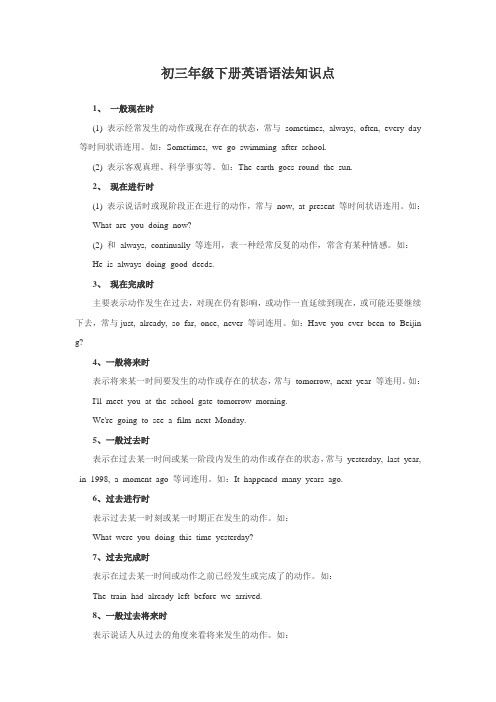
初三年级下册英语语法知识点1、一般现在时(1) 表示经常发生的动作或现在存在的状态,常与sometimes, always, often, every day 等时间状语连用。
如:Sometimes, we go swimming after school.(2) 表示客观真理、科学事实等。
如:The earth goes round the sun.2、现在进行时(1) 表示说话时或现阶段正在进行的动作,常与now, at present 等时间状语连用。
如:What are you doing now?(2) 和always, continually 等连用,表一种经常反复的动作,常含有某种情感。
如:He is always doing good deeds.3、现在完成时主要表示动作发生在过去,对现在仍有影响,或动作一直延续到现在,或可能还要继续下去,常与just, already, so far, once, never 等词连用。
如:Have you ever been to Beijin g?4、一般将来时表示将来某一时间要发生的动作或存在的状态,常与tomorrow, next year 等连用。
如:I'll meet you at the school gate tomorrow morning.We're going to see a film next Monday.5、一般过去时表示在过去某一时间或某一阶段内发生的动作或存在的状态,常与yesterday, last year, in 1998, a moment ago 等词连用。
如:It happened many years ago.6、过去进行时表示过去某一时刻或某一时期正在发生的动作。
如:What were you doing this time yesterday?7、过去完成时表示在过去某一时间或动作之前已经发生或完成了的动作。
初三(九年级)英语语法大全
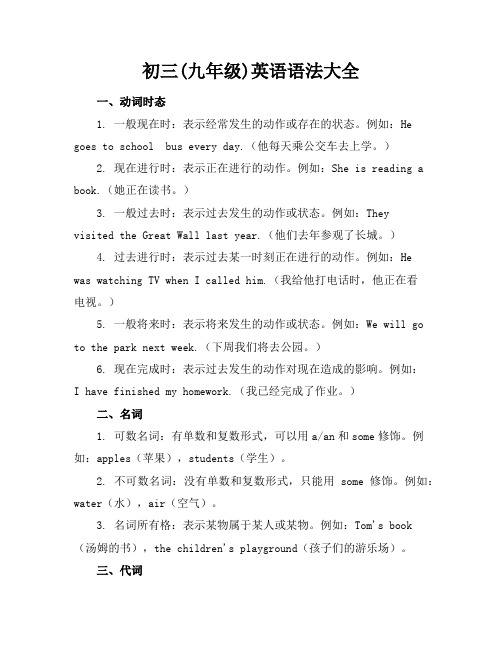
初三(九年级)英语语法大全一、动词时态1. 一般现在时:表示经常发生的动作或存在的状态。
例如:He goes to school bus every day.(他每天乘公交车去上学。
)2. 现在进行时:表示正在进行的动作。
例如:She is reading a book.(她正在读书。
)3. 一般过去时:表示过去发生的动作或状态。
例如:Theyvisited the Great Wall last year.(他们去年参观了长城。
)4. 过去进行时:表示过去某一时刻正在进行的动作。
例如:He was watching TV when I called him.(我给他打电话时,他正在看电视。
)5. 一般将来时:表示将来发生的动作或状态。
例如:We will go to the park next week.(下周我们将去公园。
)6. 现在完成时:表示过去发生的动作对现在造成的影响。
例如:I have finished my homework.(我已经完成了作业。
)二、名词1. 可数名词:有单数和复数形式,可以用a/an和some修饰。
例如:apples(苹果),students(学生)。
2. 不可数名词:没有单数和复数形式,只能用some修饰。
例如:water(水),air(空气)。
3. 名词所有格:表示某物属于某人或某物。
例如:Tom's book(汤姆的书),the children's playground(孩子们的游乐场)。
三、代词1. 人称代词:I(我),you(你/你们),he(他),she(她),it(它),we(我们),they(他们)。
2. 物主代词:my(我的),your(你的/你们的),his(他的),her(她的),its(它的),our(我们的),their(他们的)。
3. 指示代词:this(这个),that(那个),these(这些),those(那些)。
(word完整版)初三译林版英语重点语法

1. 时间状语从句1.连词:when, as, while, before, after, since,till, until, as soon as。
2.主将从现,主情从现,主祈从先现3. till或until “一直到……时”,谓语动词只能用延续性动词。
not…until “直到……才……”, 谓语动词可用瞬间动词。
2. 条件状语从句1.if,unless除非,如果不(=if…not)2.在条件状语从句里,谓语动词通常用一般现在时表示将来(即主将从现)。
3. 原因状语从句1.because,since, as引导。
2.Because和so不能出现在一个句子里。
4. 结果状语从句1.so…that, such…that, so that引导。
2.So+adj+that, such+n+that5. 目的状语从句1.so that, in order that引导。
6. 让步状语从句1.让步状语从句通常由although,though,even if , even though引导Although和but不能出现在同一个句子里。
2. --- Li Lin, is it OK for you to go to your grandpa's house alone?--- No problem. I you as soon as I there.A. call; getB. call; will getC. will call; getD. will call; will get3. The ice cream is delicious I want to eat a second one.A. too; toB. such; thatC. so; thatD. very; that4. The teacher speaks very loudly all the students can hear her.A. so thatB. becauseC. sinceD. In order to6. Father won't allow me to play outside I wash up the dishes.A. if notB. ifC. unlessD. because5. Jerry realize the importance of English he found a job.A. won't; beforeB. didn't; untilC. will; beforeD. did; until2. You must hand in your paper as soon as you it.A. will finishB. finishesC. finishD. finished(一)原级的用法1、as+形容词/副词原级+as(与…一样) =the same….as2、not as/so +形容词/副词原级+as= less+形容词/副词的原级+ than (A 不如B…)(二)比较级的用法1、than 两者(人/物)进行比较比较级+than2、or 句式:特殊疑问句,A or B?如:Who is youner, Lucy or Lily?3、修饰比较级的词:a lot, much, far …得多a little, a bit…一点儿 even 甚至 still 仍然4、of the two 比较级前要加the用the + 比较级+ of the two (the twins/parents) 两者中较……的一个。
2019整理译林版初中英语九年级下册全册单元知识点及语法整理.doc
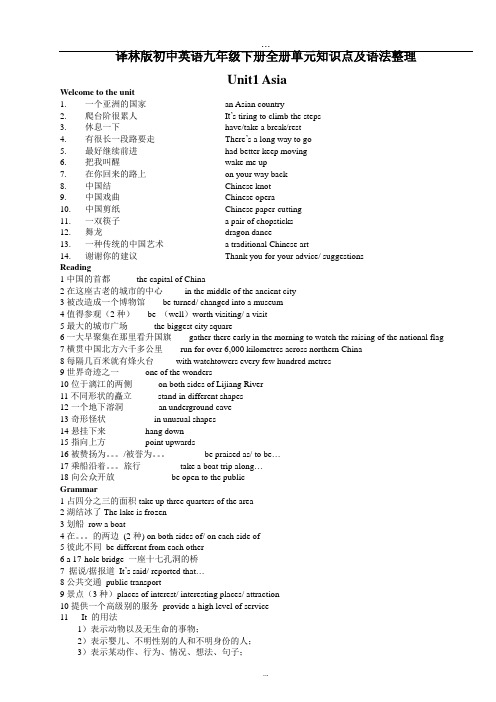
...译林版初中英语九年级下册全册单元知识点及语法整理Unit1 AsiaWelcome to the unit1.一个亚洲的国家an Asian country2.爬台阶很累人I t’s tiring to climb the steps3.休息一下have/take a break/rest4.有很长一段路要走There’s a long way to go5.最好继续前进had better keep moving6.把我叫醒wake me up7.在你回来的路上on your way back8.中国结Chinese knot9.中国戏曲Chinese opera10.中国剪纸Chinese paper-cutting11.一双筷子 a pair of chopsticks12.舞龙dragon dance13.一种传统的中国艺术 a traditional Chinese art14.谢谢你的建议Thank you for your advice/ suggestionsReading1中国的首都the capital of China2在这座古老的城市的中心in the middle of the ancient city3被改造成一个博物馆be turned/ changed into a museum4值得参观(2种)be (well)worth visiting/ a visit5最大的城市广场the biggest city square6一大早聚集在那里看升国旗gather there early in the morning to watch the raising of the national flag 7横贯中国北方六千多公里run for over 6,000 kilometres across northern China8每隔几百米就有烽火台with watchtowers every few hundred metres9世界奇迹之一one of the wonders10位于漓江的两侧on both sides of Lijiang River11不同形状的矗立stand in different shapes12一个地下溶洞an underground cave13奇形怪状in unusual shapes14悬挂下来hang down15指向上方point upwards16被赞扬为。
英语九年级全一册语法.doc
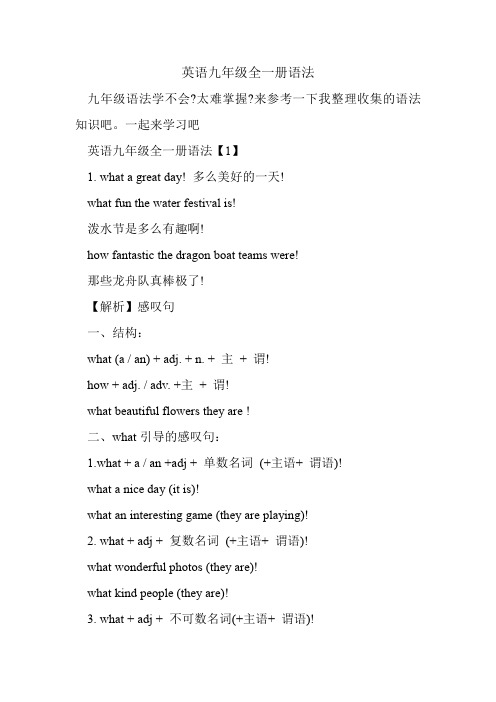
英语九年级全一册语法九年级语法学不会?太难掌握?来参考一下我整理收集的语法知识吧。
一起来学习吧英语九年级全一册语法【1】1. what a great day! 多么美好的一天!what fun the water festival is!泼水节是多么有趣啊!how fantastic the dragon boat teams were!那些龙舟队真棒极了!【解析】感叹句一、结构:what (a / an) + adj. + n. + 主+ 谓!how + adj. / adv. +主+ 谓!what beautiful flowers they are !二、what引导的感叹句:1.what + a / an +adj + 单数名词(+主语+ 谓语)!what a nice day (it is)!what an interesting game (they are playing)!2. what + adj + 复数名词(+主语+ 谓语)!what wonderful photos (they are)!what kind people (they are)!3. what + adj + 不可数名词(+主语+ 谓语)!_______ bad weather (it is)!what nice food (he cooks)!三、how引导的感叹句:1.how + adj / adv + 主语+ 谓语!how nice he is!how beautiful the flowers are!2.how + adj + a / an + 单数名词(+主语+ 谓语)!how tall a boy (he is )!how nice a song (she is singing)!3.how + adj / adv + the + 名词+ 谓语!how tall the boy is!how fine the day is!4、what 与how引导的感叹句之间的转换:1.what a beautiful girl she is != ______ beautiful the girl is !2.how delicious the food is != ______ delicious food it is !2.the dragon boat festival in hong kong 香港龙舟节【解析】介词in表地点in用于较大的地点前,如大城市、国家、洲等。
九年级下册英语语法归纳
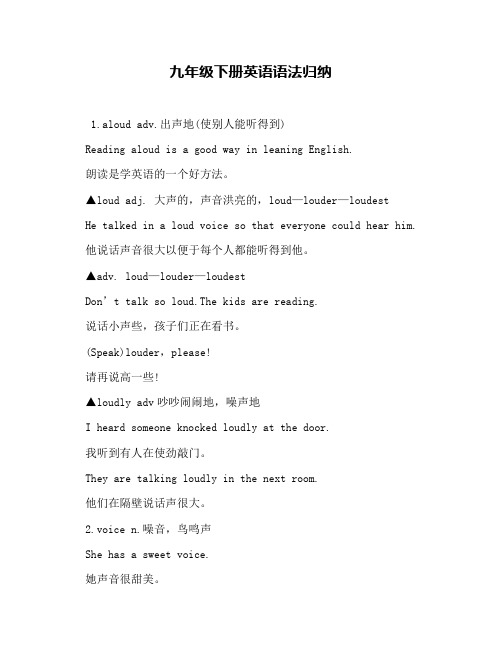
九年级下册英语语法归纳1.aloud adv.出声地(使别人能听得到)Reading aloud is a good way in leaning English.朗读是学英语的一个好方法。
▲loud adj. 大声的,声音洪亮的,loud—louder—loudestHe talked in a loud voice so that everyone could hear him.他说话声音很大以便于每个人都能听得到他。
▲adv. loud—louder—loudestDon’t talk so loud.The kids are reading.说话小声些,孩子们正在看书。
(Speak)louder,please!请再说高一些!▲loudly adv吵吵闹闹地,噪声地I heard someone knocked loudly at the door.我听到有人在使劲敲门。
They are talking loudly in the next room.他们在隔壁说话声很大。
2.voice n.噪音,鸟鸣声She has a sweet voice.她声音很甜美。
She raised her voice so that she could be heard.她提升了嗓音队便于别人能听清楚。
He lost his voice./He had no voice because of the cough.因为咳嗽,他失声了。
▲noise n噪音,吵闹Don’t make so much noise.别弄出那么大的噪音。
I heard a strange noise outside.我听到外边奇怪的声音。
▲sound n.(自然界中的)声音,响声Sound travels slower than light.声音的传播比光慢。
3.memory n.(计算机的)储存器A lot of information is stored in the memory.计算机的储存器能储存很多信息。
初中英语九年级全册全部语法汇总
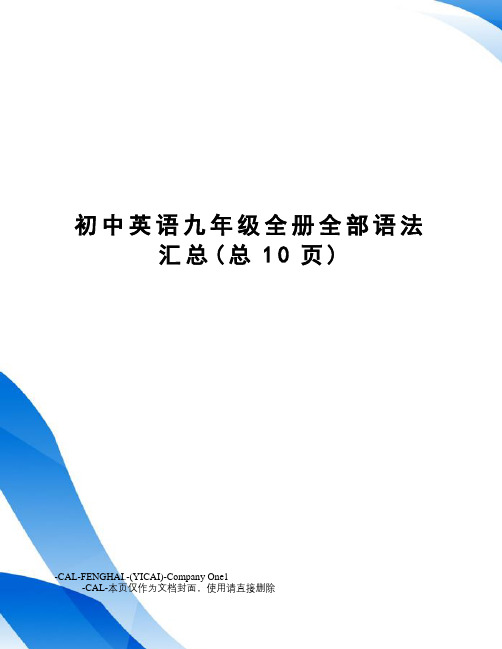
初中英语九年级全册全部语法汇总(总10页)-CAL-FENGHAI.-(YICAI)-Company One1-CAL-本页仅作为文档封面,使用请直接删除一. 介词by的用法1. 意为“在……旁”,“靠近”。
Some are singing and dancing under a big tree. Some are drawing by the lake.有的在大树下唱歌跳舞。
有的在湖边画画儿。
2. 意为“不迟于”,“到……时为止”。
Your son will be all right by supper time.你的儿子在晚饭前会好的。
How many English songs had you learned by the end of last term?到上个学期末你们已经学了多少首英语歌曲?3. 表示方法、手段,可译作“靠”、“用”、“凭借”、“通过”、“乘坐”等。
The monkey was hanging from the tree by his tail and laughing.猴子用尾巴吊在树上哈哈大笑。
The boy’s father was so thankful that he taught Edison how to send messages by railway telegraph.孩子的父亲是那么的感激,于是他教爱迪生怎样通过铁路电报来传达信息。
4. 表示“逐个”,“逐批”的意思。
One by one they went past the table in the dark.他们一个一个得在黑暗中经过这张桌子。
5. 表示“根据”,“按照”的意思。
What time is it by your watch?你的表几点了?6. 和take , hold等动词连用,说明接触身体的某一部分。
I took him by the hand.我拉住了他的手。
7. 用于被动句中,表示行为主体,常译作“被”、“由”等。
人教版英语九年级下册语法总结1

人教版英语九年级下册语法1冠词a/an/the/x的辨析1. 不定冠词(1) 不定冠词有两个:a和an。
a用于以辅音音素开头的单词之前,an用于以元音音素开头的单词之前。
当形容词修饰名词时,冠词要放在形容词的前面,这时用a或an取决于这个形容词的读音。
(2) 不定冠词的用法:①用于第一次提到的、不确定的人或物(可数名词)之前;②用于重量或时间等表示单位的名词前面,是“每……”的意思;③表示职业、身份;④用于数字hundred, thousand, million、量词之前;⑤用于一些固定词组中,如:have a rest 休息;make a living 谋生。
例:I read a book every month.我每个月读一本书。
An apple a day keeps the doctor away.每天一个苹果,医生远离我。
注意:有些单词虽然以元音字母开头,但是前面用不定冠词a,如university (大学)。
这是因为u在此发[ ju: ],以辅音音素开头用a。
同样,有些单词虽然以辅音字母开头,但是前面用不定冠词an,如hour。
这是因为h在此不发音,ou发[aʊ]的音,以元音音素开头用an。
2. 定冠词the(1) 一般用法:①用于第二次谈到的人或物。
②用于双方共知的人或物。
③“the + n.单数”可以表示一类人或物。
例:The telephone was invented by Bell.电话是由Bell发明的。
④指世界上独一无二的事物。
(2) 特殊用法:定冠词常用于一些特定词的前面。
助记:沙漠、河流与群山;列岛、海峡与海湾;阶级、党派、国家名;组织、团体和机关;方位、朝代、独一词;会议、文件及报刊;乐器、建筑、海洋群;定冠词帽戴在前。
①用于姓氏复数之前表示夫妇或全家人。
②“the + adj.”表示一类人或物。
如:the young 年轻人。
③用于一些固定词组中:in the evening在晚上;at the time在那时;go to the movies去看电影。
9年级下册英语语法
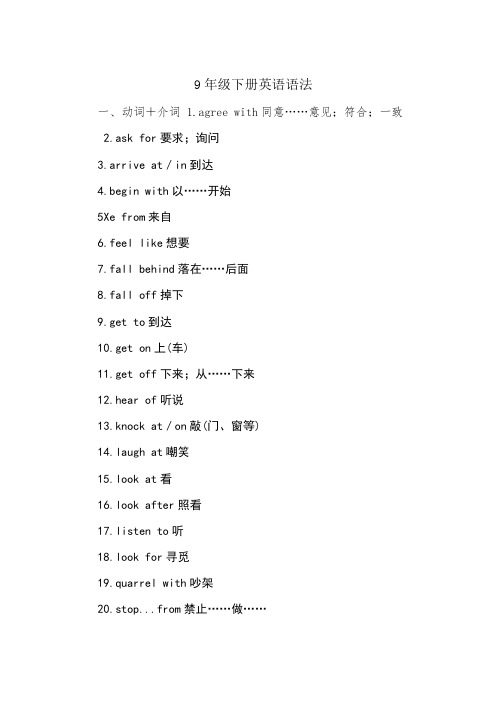
9年级下册英语语法一、动词+介词 1.agree with同意……意见;符合;一致2.ask for要求;询问3.arrive at/in到达4.begin with以……开始5Xe from来自6.feel like想要7.fall behind落在……后面8.fall off掉下9.get to到达10.get on上(车)11.get off下来;从……下来12.hear of听说13.knock at/on敲(门、窗等)ugh at嘲笑15.look at看16.look after照看17.listen to听18.look for寻觅19.quarrel with吵架20.stop...from禁止……做……21.wait for等候二、动词+副词1Xe out出来;花开2Xe over顺便来访;过来3Xe along来;随同4Xe in进来5.eat up吃光6.fall down倒下;跌倒7.find out找出;查明8.go back回去9.go on连续10.go out外出11.get back回来;取回12.grow up长大;成长13.get up起床14.go home回家15.hurry up赶快16.hold on不挂断;等一等17.look out留心;注意18.look over检查19.look up向上看;查阅20.move away搬走21.put on穿上;上演22.pass on传递23.run away逃跑24.ring up打电话25.set off动身;动身26.throw out乱丢;抛散27.turn on打开28.turn off关29.take out取出30.trip over绊倒31.turn...over把……翻过来32.write down写下;记下33.wake up醒来34.work out算出;解出三、动词+副词+介词1.be fed up with厌倦2.catch up with遇上3.go on with连续4.get on with与……相处5.pull...up from把……从……中拉出来四、动词+名词+介词1.take care of照管;照管2.make room for给……腾出地方3.make friends with与……交朋友4.play a joke on戏弄某人5.have a look at看一看6.have a drink of喝一点7.say goodbye to辞别;告辞五、动词+形容词+介词1.be late for迟到2.be angry with动气3.be busy with忙于4.be short for是……的简称5.be interested in对……感爱好6.be famous for因……而7.be good at善于8.be different from与……不同9.be good/bad for对……有益/害10.be friendly to对……友好。
初中英语九年级下语法知识点总结

初中英语九年级下语法知识点总结Module1Travel(talking about travel)Main grammar point:Articles主要语法知识点:名词&冠词&数词名词:1.可数名词和不可数名词(countable and uncountable nouns)一般来说,可数名词包括普通名词:①个体名词(用来指某人或事物中的个体的名词)bird鸟car汽车doctor医生novel小说等②集体名词(指一群人或事物的名词)army军队cattle牛class全班同学等不可数名词包括:①物质名词(指无法分为个体的物质、材料、食品、饮料、液体、气体、金属的名称的词)brick砖beef牛肉water水smoke烟iron铁②抽象名词(指人或事物的品质、情感、状态、动作等抽象概念及学科疾病等名称的词)kindness仁慈love热爱hunger饿behavior行为English英语beauty美丽另外,同一个单词如果所指不同,其数的概念也不同,如paper做“纸”时是不可数名词,做“报纸,试卷”时是可数名词。
2.名词的数的变化①一般情况下,直接加-s,如:book-books,bag-bags,cat-cats,bed-beds②以s.x.sh.ch结尾,加-es,如:bus-buses,box-boxes,brush-brushes,watch-watches③以o结尾的名词,变复数时:a.加s,如:photo---photos piano---pianosradio---radios zoo---zoos;b.加es,如:potato--potatoes tomato--tomatoesc.均可,如:zero---zeros/zeroes④以“辅音字母+y”结尾,变y为i,再加-es,如:family-families,strawberry-strawberries⑤以“f或fe”结尾,变f或fe为v,再加-es,如:knife-knives⑥不规则名词复数:man-men,woman-women,policeman-policemen,mouse-mice child-children foot-feet,.tooth-teeth fish-fish,people-people,Chinese-Chinese,Japanese-Japanese⑦表示由两部分构成的东西,如:glasses(眼镜)trousers,clothes若表达具体数目,要借助数量词pair(对,双);suit(套);a pair of glasses;two pairs of trousers⑧单复同形如:deer,sheep,fish,Chinese,Japanese3名词所有格一般情况下名词后加‘s:①在以s结尾的名词(包括以s结尾的复数名词)后面,只加'。
人教版九年级语法总结
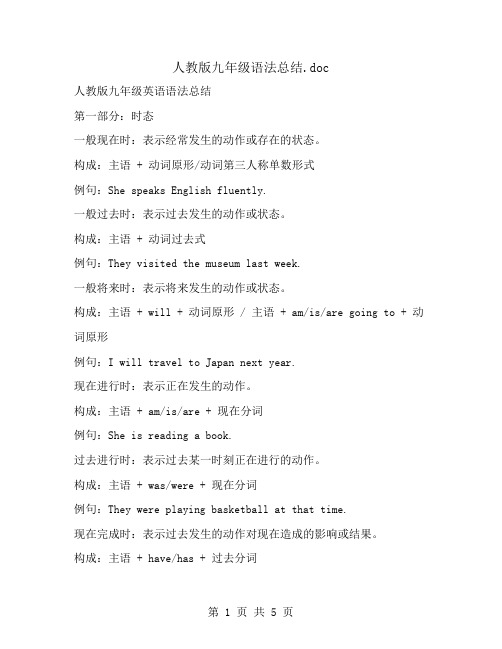
人教版九年级语法总结.doc人教版九年级英语语法总结第一部分:时态一般现在时:表示经常发生的动作或存在的状态。
构成:主语 + 动词原形/动词第三人称单数形式例句:She speaks English fluently.一般过去时:表示过去发生的动作或状态。
构成:主语 + 动词过去式例句:They visited the museum last week.一般将来时:表示将来发生的动作或状态。
构成:主语 + will + 动词原形 / 主语 + am/is/are going to + 动词原形例句:I will travel to Japan next year.现在进行时:表示正在发生的动作。
构成:主语 + am/is/are + 现在分词例句:She is reading a book.过去进行时:表示过去某一时刻正在进行的动作。
构成:主语 + was/were + 现在分词例句:They were playing basketball at that time.现在完成时:表示过去发生的动作对现在造成的影响或结果。
构成:主语 + have/has + 过去分词例句:I have finished my homework.过去完成时:表示过去的过去完成的动作。
构成:主语 + had + 过去分词例句:She had finished her homework before I called her. 将来进行时:表示将来某一时刻正在进行的动作。
构成:主语 + will be + 现在分词例句:He will be studying at that time.将来完成时:表示将来某一时间之前完成的动作。
构成:主语 + will have + 过去分词例句:We will have finished the project by next month. 第二部分:被动语态一般现在时被动语态:am/is/are + 过去分词例句:The letter is written by him.一般过去时被动语态:was/were + 过去分词例句:The house was built in 2010.一般将来时被动语态:will be + 过去分词例句:A new school will be built next year.现在完成时被动语态:have/has been + 过去分词例句:The problem has been solved.其他时态的被动语态:相应时态的构成+过去分词例句:The book was being read by her when I entered.第三部分:非谓语动词动名词:动词+ing,用作主语、宾语等。
人教版九年级英语下册各单元知识点归纳总结

人教版九年级英语下册全册各单元必考知识点目录Unit7 知识要点梳理 (2)【重点短语】 (2)【重点句型】 (3)【考点详解】 (4)【重点语法】 (6)Unit8 知识要点梳理 (8)【重点短语】 (8)【重点句型】 (8)【考点详解】 (9)【重点语法】 (12)Unit9 知识要点梳理 (12)【重点短语】 (12)【重点句型】 (13)【考点详解】 (14)Unit10 知识要点梳理 (16)【重点短语】 (16)【重点句型】 (16)【考点详解】 (17)Unit11 知识要点梳理 (21)【重点短语】 (21)【重点句型】 (21)【考点详解】 (22)Unit12 知识要点梳理 (25)【重点短语】 (25)【重点句型】 (25)【考点详解】 (26)【重点语法】 (28)Unit13 知识要点梳理 (30)【重点短语】 (30)【重点句型】 (31)【考点详解】 (31)【重点语法】 (33)Unit14 知识要点梳理 (36)【重点短语】 (36)【重点句型】 (37)【考点详解】 (38)Unit7 知识要点梳理【重点短语】1. be allowed to do sth. 被允许做某事allow sb. to do sth. 允许某人做某事allow doing sth. 允许做某事2. sixteen-year-olds = sixteen-year-old boys and girls 16岁的孩子3. part-time jobs 兼职工作4. a driver’s license 驾照5. on weekends 在周末6. at that age 在那个年龄段7. on school nights 在上学期间的晚上8. stay up 熬夜9. clean up 清扫10. fail(in)a test 考试不及格11. take the test 参加考试12. the other day 前几天13. all my classmates 我所有的同学14. concentrate on 全神贯注于15. be good for 对…...有益16. in groups 成群的,按组17. get noisy 变得吵闹(系表结构)18. learn from 向......学习19. at present 目前,现在20. have an opportunity to do sth. 有做……的机会【重点句型】1. I don’t think twelve-year-olds should be allowed to get their ears pierced.我认为不应该允许12岁的孩子穿耳孔。
(完整版)外研版初中英语九年级下册语法表

(完整版)外研版初中英语九年级下册语法表一、时态1. 一般现在时- 表示经常性或惯性动作,事实真相。
- 结构:主语 + 动词原形或动词第三人称单数形式2. 现在进行时- 表示现阶段正在进行的动作。
- 结构:主语 + am/is/are + 动词-ing 形式3. 一般过去时- 表示过去某个时间或阶段的动作或状态。
- 结构:主语 + 动词过去式4. 过去进行时- 表示过去某一时刻正在进行的动作。
- 结构:主语 + was/were + 动词-ing 形式5. 一般将来时- 表示将来某个时间或状态的动作。
- 结构:主语 + will + 动词原形二、语态1. 被动语态- 主语是动作的承受者,强调对主语的动作。
- 结构:主语 + am/is/are + 过去分词2. 主动语态- 主语是动作的执行者,不强调对主语的动作。
- 结构:主语 + 动词原形三、比较级与最高级1. 比较级- 表示两者之间的比较。
- 结构:形容词/副词的比较级 + than2. 最高级- 表示三者或三者以上之间的比较。
- 结构:形容词/副词的最高级 + of四、情态动词1. can- 表示能力或允许。
- 结构:主语 + can + 动词原形2. may- 表示允许或可能性。
- 结构:主语 + may + 动词原形3. must- 表示必须或推测。
- 结构:主语 + must + 动词原形4. should- 表示建议或责任。
- 结构:主语 + should + 动词原形五、名词1. 单数名词- 表示单个事物。
- 结构:单数名词 + 单数动词2. 复数名词- 表示多个事物。
- 结构:复数名词 + 复数动词六、动词1. 动词原形- 表示动作的原始形式。
- 结构:动词原形2. 动词过去式- 表示过去已经完成的动作。
- 结构:动词过去式3. 动词-ing 形式- 表示正在进行的动作。
- 结构:动词-ing 形式以上为初中英语九年级下册的语法表,希望对您有所帮助。
初三英语语法总结大全
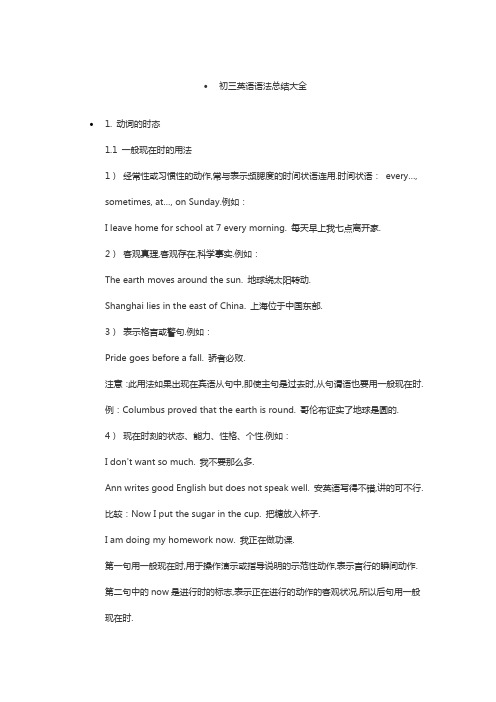
•初三英语语法总结大全• 1. 动词的时态1.1 一般现在时的用法1)经常性或习惯性的动作,常与表示频腮度的时间状语连用.时间状语:every…, sometimes, at…, on Sunday.例如:I leave home for school at 7 every morning. 每天早上我七点离开家.2)客观真理,客观存在,科学事实.例如:The earth moves around the sun. 地球绕太阳转动.Shanghai lies in the east of China. 上海位于中国东部.3)表示格言或警句.例如:Pride goes before a fall. 骄者必败.注意:此用法如果出现在宾语从句中,即使主句是过去时,从句谓语也要用一般现在时.例:Columbus proved that the earth is round. 哥伦布证实了地球是圆的.4)现在时刻的状态、能力、性格、个性.例如:I don't want so much. 我不要那么多.Ann writes good English but does not speak well. 安英语写得不错,讲的可不行.比较:Now I put the sugar in the cup. 把糖放入杯子.I am doing my homework now. 我正在做功课.第一句用一般现在时,用于操作演示或指导说明的示范性动作,表示言行的瞬间动作.第二句中的now是进行时的标志,表示正在进行的动作的客观状况,所以后句用一般现在时.返回动词的时态目录1.2 一般过去时的用法1)在确定的过去时间里所发生的动作或存在的状态.例如:时间状语有:yesterday, last week, an hour ago, the other day, in 1982等.例如:Where did you go just now? 刚才你上哪儿去了?2)表示在过去一段时间内,经常性或习惯性的动作.例如:When I was a child, I often played football in the street. 我是个孩子的时候,常在马路上踢足球.Whenever the Browns went during their visit, they were given a warm welcome.那时,布朗一家无论什么时候去,都受到热烈欢迎.3)句型:It is time for sb. to do sth "到……时间了" "该……了".例如:It is time for you to go to bed. 你该睡觉了.It is time that sb. did sth. "时间已迟了" "早该……了" ,例如It is time you went to bed. 你早该睡觉了.would (had)rather sb. did sth. 表示'宁愿某人做某事'.例如:I'd rather you came tomorrow.还是明天来吧.4)wish, wonder, think, hope 等用过去时,作试探性的询问、请求、建议等,而一般过去时表示的动作或状态都已成为过去,现已不复存在.例如:I thought you might have some. 我以为你想要一些.比较:Christine was an invalid all her life.(含义:她已不在人间.)Christine has been an invalid all her life.(含义:她现在还活着)Mrs. Darby lived in Kentucky for seven years. (含义:达比太太已不再住在肯塔基州.)Mrs. Darby has lived in Kentucky for seven years. (含义:现在还住在肯塔基州,有可能指刚离去)注意:用过去时表示现在,表示委婉语气.1)动词want, hope, wonder, think, intend 等.例如:Did you want anything else? 您还要些什么吗?I wondered if you could help me. 能不能帮我一下.2)情态动词could, would.例如:Could you lend me your bike? 你的自行车,能借用一些吗?返回动词的时态目录1.3 used to / be used toused to + do:"过去常常"表示过去习惯性的动作或状态,但如今已不存在.例如:Mother used not to be so forgetful. 老妈过去没那么健忘.Scarf used to take a walk. 斯卡夫过去常常散步.be used to + doing:对……已感到习惯,或"习惯于",to是介词,后需加名词或动名词.例如:He is used to a vegetarian diet.Scarf is used to taking a walk. 斯卡夫现在已习惯于散步了.典型例题---- Your phone number again? I ___ quite catch it.---- It's 69568442.A. didn'tB. couldn'tC. don'tD. can't答案A. 本句虽没有明确的时间状语,但从语意上看出,在听的时候没有听懂这个动作发生在过去,因此应用过去时.返回动词的时态目录1.4 一般将来时1)shall用于第一人称,常被will 所代替.will 在陈述句中用于各人称,在征求意见时常用于第二人称.例如:Which paragraph shall I read first? 我先读哪一段呢?Will you be at home at seven this evening? 今晚七点回家好吗?2)be going to +不定式,表示将来.a. 主语的意图,即将做某事.例如:What are you going to do tomorrow? 明天打算作什么呢?b. 计划,安排要发生的事.例如:The play is going to be produced next month.这出戏下月开播.c. 有迹象要发生的事.例如:Look at the dark clouds, there is going to be a storm. 看那乌云,快要下雨了.3)be +不定式表将来,按计划或正式安排将发生的事.例如:We are to discuss the report next Saturday.我们下星期六讨论这份报告.4)be about to +不定式,意为马上做某事.例如:He is about to leave for Beijing. 他马上要去北京.注意:be about to do 不能与tomorrow, next week 等表示明确将来时的时间状语连用.返回动词的时态目录1.5 be going to / will 用于条件句时,be going to表将来,will表意愿.例如:If you are going to make a journey, you'd better get ready for it as soon as possible.Now if you will take off your clothes, we will fit the new clothes on you in front of the mirror.返回动词的时态目录1.6 be to和be going tobe to 表示客观安排或受人指示而做某事,be going to 表示主观的打算或计划.例如:I am to play football tomorrow afternoon. 明天下午我去踢球.(客观安排)I'm going to play football tomorrow afternoon. 明天下午我想去踢球.(主观安排)返回动词的时态目录1.7 一般现在时表将来1)下列动词come, go, arrive, leave, start, begin, return的一般现在时可以表示将来,主要用来表示在时间上已确定或安排好的事情.例如:The train leaves at six tomorrow morning. 火车明天上午六点开.When does the bus star? It stars in ten minutes. 汽车什么时候开?十分钟后. 2)以here, there等开始的倒装句,表示动作正在进行.例如:Here comes the bus. = The bus is coming. 车来了.There goes the bell. = The bell is ringing. 铃响了.3)在时间或条件句中.例如:When Bill comes (不是will come), ask him to wait for me. 比尔来后,让他等我.I'll write to you as soon as I arrive there. 我到了那里,就写信给你.4)在动词hope, take care that, make sure that等的宾语从句中.例如:I hope they have a nice time next week. 我希望他们下星期玩得开心.Make sure that the windows are closed before you leave the room. 离开房间前,务必把窗户关了.返回动词的时态目录1.8 用现在进行时表示将来下列动词come, go, arrive, leave, start, begin, return等现在进行时可以表示将来.例如:I'm leaving tomorrow. 明天我要走了.Are you staying here till next week? 你会在这儿呆到下周吗?返回动词的时态目录1.9 现在完成时现在完成时用来表示之前已发生或完成的动作或状态,其结果的影响现在还存在;也可表示持续到现在的动作或状态.其构成:have (has)+过去分词.返回动词的时态目录1.10 比较一般过去时与现在完成时1)一般过去时表示过去某时发生的动作或单纯叙述过去的事情,强调动作;现在完成时为过去发生的,强调过去的事情对现在的影响,强调的是影响.2)一般过去时常与具体的时间状语连用,而现在完成时通常与模糊的时间状语连用,或无时间状语.一般过去时的时间状语:yesterday, last week,…ago, in1980, in October, just now等,皆为具体的时间状语.现在完成时的时间状语:for, since, so far, ever, never, just, yet, till/until, up to now, in past years, always等,皆不确定的时间状语.共同的时间状语:this morning, tonight, this April, now, already, recently, lately 等.3)现在完成时可表示持续到现在的动作或状态,动词一般是延续性的,如live, teach, learn, work, study, know..一般过去时常用的非持续性动词有come, go, leave, start, die, finish, become, get married等.例如:I saw this film yesterday. (强调看的动作发生过了)I have seen this film. (强调对现在的影响,电影的内容已经知道了)Why did you get up so early? (强调起床的动作已发生过了)Who hasn't handed in his paper? (强调有卷子未交,疑为不公平竞争)He has been in the League for three years. (在团内的状态可延续)He has been a League member for three years. (是团员的状态可持续)句子中如有过去时的时间副词(如yesterday, last, week, in 1960)时,不能使用现在完成时,要用过去时.(错)Tom has written a letter to his parents last night.(对)Tom wrote a letter to his parents last night.返回动词的时态目录1.1 用于现在完成时的句型1)It is the first / second time. that…结构中的从句部分,用现在完成时.例如:It is the first time that I have visited the city. 这是我第一次访问这城市. This is the first time (that)I've heard him sing. 这是我第一次听他唱歌. 注意:It was the third time that the boy had been late.2)This is +形容词最高级+that…结构,that 从句要用现在完成时.例如:This is the best film that I've (ever)seen. 这是我看过的最好的电影.。
九年级下英语语法
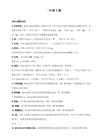
如:Compare you to Anna, you are lucky.你和安娜相比,你是幸运的。
35. instead 代替 用在句末,副词(字面上常不译出来)
instead of sth. / doing sth. 代替,而不是 用在句中,动词
laugh等动词连用,多用于比较级,须放在动词之后。如:
She told us to speak a little louder. 她让我们说大声一点。
③loudly是副词,与loud同义,有时两者可替换使用,但往往
含有令人讨厌或打扰别人的意思,可位于动词之前或之后。
如: He does not talk loudly or laugh loudly in public. 他不当众大声谈笑。
13. laugh at sb. 笑话;取笑(某人) 如:Don't laugh at me!不要取笑我!
14. take notes 做笔记,做记录
15. enjoy doing sth . 喜欢做…乐意做… She enjoys playing football.她喜欢踢足球。
enjoy oneself 过得愉快 如:He enjoyed himself. 他过得愉快。
如:It's difficult (for me ) to study English. 对于我来说学习英语太难了。
句中的it 是形式主语,真正的主语是to study English
20. practice doing 练习做某事 如:
She often practice speaking English. 她经常练习说英语。
(word完整版)初中英语语法大全-打印版,推荐文档

九种基本时态一一般现在时概念:表示经常发生的动作或经常存在的状态。
常和always, often, sometimes, every day 等表示时间的状语连用。
如:1)I go to school every day. 我每天都去学校。
(表经常)2)He is always like that. 他总是那样。
(表状态)构成:1)主语+be (am/ are/ is) +……2)主语+实义动词+……二一般过去时概念:1)表示过去某个时间发生的动作或存在的状态。
常和表示过去的时间状语连用。
如:yesterday, last week, in 1998, two days ago 等。
如:I went to a movie yesterday. 我昨天去看了一场电影。
2)也可表示过去经常或反复发生的动作。
如:He always went to work by bike last week.构成:1)主语+be (was/ were) +……2)主语+实义动词过去式+……三现在进行时概念:表示现在(说话瞬间)正在进行或发生的动作。
如:He is singing.They are watching TV now.构成:主语+助动词be (am/ are/ is)+动词-ing形式构成。
四过去进行时概念:表示过去某一时刻或某一段时间正在进行的动作。
这一特定的过去时间除了有上下文暗示外,一般用时间状语来表示。
如:1)---What were you doing ?---I was jumping.2) ---What was the boy doing when the UFO arrived?---He was sleeping.构成:主语+助动词be (was/ were) + 动词-ing形式构成。
五一般将来时概念:表示将来某个时间要发生的动作或存在的状态,也表示将来经常或反复发生的动作,常与表示将来的时间状语连用。
九年级下册英语语法

Unit 5 Learning about ChinaTopic 1 Could you tell me something about the places that you visited?about 5000 years of history 大约5000年的历史吸引了许多游客attract many touristsmillions of数以百万a (great) number of许多the longest river/the second longest river/the third longest river第一、二、三长河中华民族文化的发源地the birthplaces of Chinese culture还有一些别的吗?Anything else?给某人取某物fetch sth for sb=fetch sb. sth.我能给你一本《中国指南》I can fetch you Guide to China.详细介绍……introduce…in detail位于lie in(范围内) lie to(范围外) lie on(接壤)穿过,流经run through汇入渤海join the Bohai Sea淡水湖the fresh water lake第二大淡水湖the second largest fresh water lake在中国的西南部be in the southwest of China青藏高原the Qinghai-Tibet Plateau很值得做某事be well worth doing sth海拔above sea level多么令人惊奇啊What a surprise!最奇妙的地方the most fantastic place听说过hear of实现come true国内外home and abroad三面环山be surrounded on three sides by mountains陶醉于…,全神贯注于…,沉浸于…… lose oneself in…因为because of sth.…之乡the home of龙井茶the Dragon Well龙井茶之乡the home of Dragon Well Tea寻找机会做某事look for a chance to do sth.与某人分享……share sth. with sb.如此……以至so…that…不但……而且not only…but also…被认为是,作为……而著名be known as… 因……而著名be known for….把…看作/认为regard …as …be regarded as=be considered as …东方明珠the Oriental Pearl购物天堂Shopping Heaven想起,考虑,认为think of品尝各种各样鲜美的水果enjoy various delicious fruits来某处旅游come to sw. for a visit作为……服务的桥梁serve as a bridge损坏,抛锚,变得恶劣break down驾驶执照the driving license拿走take away有不同的特点have different feasures与…截然不同be quite different from南北有很大的不同There are many differences between the north and the south. 零度以上/以下stay below / above zero雪下得很大snow heavily雨下得很大rain heavily风刮得很大blow strongly被…覆盖be covered with做户外运动do outdoor activities堆雪人make snowmen仍雪球throw snow balls滑冰go skating温暖潮湿mild and wet享受明媚的阳光enjoy the bright sunshine在海滩上on the beach人们的生活方式people’s way of life习惯于吃面食be used to eating food made with flour面食food made with flour生活在北方平原live on the northern plains通过陆路来往come and go by land走陆路/走水路travel by land / by waterTopic 2 Confucius, a pioneer in the field of education.在教育领域in the field of education.一个教育领域的先驱者a pioneer in the field of education.一个伟大的思想家a great ancient philosopher真知灼见wise ideas and thoughts人类行为human behavior主要思想main ideas礼貌good manners至理名言wise sayings从…学会learn sth. from在…多岁时at the age of …在他三十多岁时in his thirties温故而知新Learn the new while reviewing the old 为...感到骄傲be proud of =be the pride of 航海ocean journeys死于疾病die of illness总共in total积极参加take an active part in受…欢迎be popular with成立set up推翻bring down因…而跨掉,出故障,坏掉break down from…成功做某事succeed in doing sth去世pass away演讲give a speech讲学give a lecture发明杂交水稻develop hybrid rice获得诺贝尔物理奖win the Nobel Prize for Physics消灭wipe out到安全地点to safety=to the safe place一份新长征计划a new Long March Topic 3带某人参观某地show sb. around sw.给某人看…show sb. to sw.王权的象征a symbol of imperial power 真龙天子real dragons and the sons of heaven中华民族的象征a symbol of the Chinese nation扮演一个角色play a/an…part in…=play a/an ……role…在中国节日中占重要角色play an important part in Chinese festival 龙年the year of the dragon鼓励某人做某事encourage sb. to do sth. 承诺做某事promise to do sth.承诺接受意见promise to follow the suggestions要么..要么either…or…围挤在…周围crowd around…下象棋play Chinese chess …和…都…, 两者都…Both …and …两者都都不…Neither …nor …为了…in order to …为反对…而斗争,与…战斗fight against 为了纪念某人/某事in memory of爆发break out依靠,依赖,取决于depend on在某人的帮助下with one’s help=with the help of sb. 最…之一one of the +形容词最高级+名词复数在三世纪in the 3 rd century在…末梢at the end of….传开,传播,蔓延spread to /through。
九年级下册英语语法知识
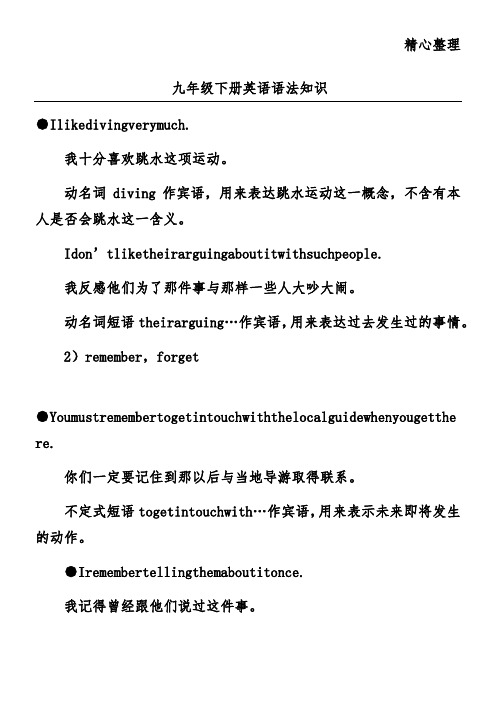
精心整理 动名词短语 tellingthem…作宾语,用来表达过去发生过的事情。
●I’llneverforgethavingworkedtherewithfarmersfornearlyamon th.
我永远也忘不了与农民在那里工作了近一个月的日日夜夜。 动名词短语 h强调过去发生过 并延续一段时间的事情。
精心整理
九年级下册英语语法知识 ●Ilikedivingverymuch.
我十分喜欢跳水这项运动。 动名词 diving 作宾语,用来表达跳水运动这一概念,不含有本 人是否会跳水这一含义。 Idon’tliketheirarguingaboutitwithsuchpeople. 我反感他们为了那件事与那样一些人大吵大闹。 动名词短语 theirarguing…作宾语,用来表达过去发生过的事情。 2)remember,forget
●Youmustremembertogetintouchwiththelocalguidewhenyougetthe re.
你们一定要记住到那以后与当地导游取得联系。 不定式短语 togetintouchwith…作宾语,用来表示未来即将发生 的动作。 ●Iremembertellingthemaboutitonce. 我记得曾经跟他们说过这件事。
九年级下册英语知识点
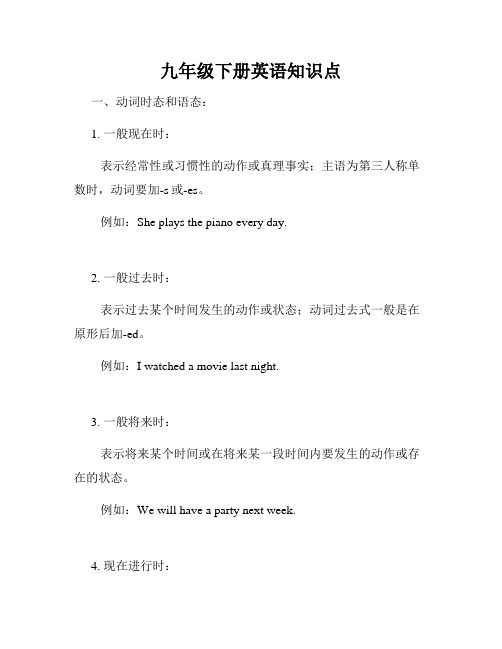
九年级下册英语知识点一、动词时态和语态:1. 一般现在时:表示经常性或习惯性的动作或真理事实;主语为第三人称单数时,动词要加-s或-es。
例如:She plays the piano every day.2. 一般过去时:表示过去某个时间发生的动作或状态;动词过去式一般是在原形后加-ed。
例如:I watched a movie last night.3. 一般将来时:表示将来某个时间或在将来某一段时间内要发生的动作或存在的状态。
例如:We will have a party next week.4. 现在进行时:表示现在正在进行的动作或存在的状态;构成:be动词(am, is, are)+动词的现在分词(-ing)。
例如:He is reading a book now.5. 过去进行时:表示过去某个时间正在进行的动作;构成:was/were + 动词的现在分词(-ing)。
例如:They were playing soccer yesterday.6. 现在完成时:表示过去某个时间开始的动作一直延续到现在或与现在有关的动作和经历。
例如:I have visited Beijing three times.7. 过去完成时:表示过去某个时间或某一动作前已经完成的动作。
例如:She had finished her homework before her parents came back.8. 动态被动语态:表示动作的接受者比执行者更重要或并不知道执行者。
例如:The book was written by Mark Twain.二、名词性从句:1. 主语从句:主语从句在句子中充当主语的作用。
例如:What he said is true.2. 宾语从句:宾语从句在句子中充当宾语的作用。
例如:I believe that he can pass the exam.3. 表语从句:表语从句在句子中充当表语的作用。
- 1、下载文档前请自行甄别文档内容的完整性,平台不提供额外的编辑、内容补充、找答案等附加服务。
- 2、"仅部分预览"的文档,不可在线预览部分如存在完整性等问题,可反馈申请退款(可完整预览的文档不适用该条件!)。
- 3、如文档侵犯您的权益,请联系客服反馈,我们会尽快为您处理(人工客服工作时间:9:00-18:30)。
九年级下册英语语法大全
九年级下册英语语法大全
Topic 1 Could you tell me something about the places that you visited?
about 5000 years of history 大约5000年的历史
吸引了许多游客attract many tourists
millions of数以百万
a (great) number of许多
the longest river/the second longest river/the third longest river 第一、二、三长河
中华民族文化的发源地
the birthplaces of Chinese culture
还有一些别的吗?Anything else?
给某人取某物fetch sth for sb=fetch sb. sth.
我能给你一本《中国指南》
I can fetch you Guide to China.
详细介绍introducein detail
位于
lie in(范围内) lie to(范围外) lie on(接壤)
穿过,流经run through
汇入渤海join the Bohai Sea
淡水湖the fresh water lake
第二大淡水湖
the second largest fresh water lake
在中国的西南部
be in the southwest of China
青藏高原the Qinghai-Tibet Plateau
很值得做某事be well worth doing sth
海拔above sea level
多么令人惊奇啊What a surprise!
最奇妙的地方the most fantastic place
听说过hear of
实现come true
国内外home and abroad
三面环山
be surrounded on three sides by mountains
陶醉于,全神贯注于,沉浸于lose oneself in 因为because of sth.
之乡the home of
龙井茶the Dragon Well
龙井茶之乡the home of Dragon Well Tea
寻找机会做某事
look for a chance to do sth.
与某人分享share sth. with sb.
如此以至sothat
不但而且not onlybut also
被认为是,作为而著名be known as 因而著名be known for.
把看作/认为regard as
be regarded as=be considered as
东方明珠the Oriental Pearl
购物天堂Shopping Heaven
想起,考虑,认为think of
品尝各种各样鲜美的水果
enjoy various delicious fruits
来某处旅游come to sw. for a visit
作为服务的桥梁serve as a bridge
损坏,抛锚,变得恶劣break down
驾驶执照the driving license
拿走take away
有不同的特点have different feasures
与截然不同be quite different from
南北有很大的不同There are many differences between the north and the south.
零度以上/以下stay below / above zero
雪下得很大snow heavily
雨下得很大rain heavily
风刮得很大blow strongly
被覆盖be covered with
做户外运动do outdoor activities
堆雪人make snowmen
仍雪球throw snow balls
滑冰go skating
温暖潮湿mild and wet
享受明媚的阳光enjoy the bright sunshine 在海滩上on the beach。
